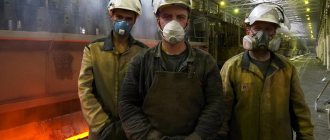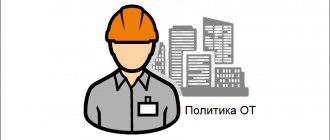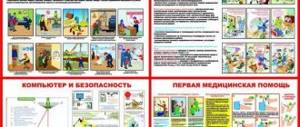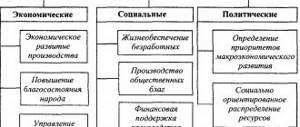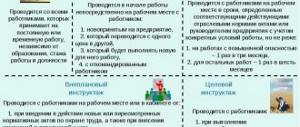New edition of Art. 214 Labor Code of the Russian Federation
The employee is obliged:
comply with labor protection requirements;
correctly use personal and collective protective equipment;
undergo training in safe methods and techniques for performing work and providing first aid to victims at work, instruction on labor protection, on-the-job training, testing of knowledge of labor protection requirements;
immediately notify your immediate or superior manager about any situation that threatens the life and health of people, about every accident that occurs at work, or about a deterioration in your health, including the manifestation of signs of an acute occupational disease (poisoning);
undergo mandatory preliminary (upon employment) and periodic (during employment) medical examinations, other mandatory medical examinations, as well as undergo extraordinary medical examinations at the direction of the employer in cases provided for by this Code and other federal laws.
Commentary on Article 214 of the Labor Code of the Russian Federation
The commented article establishes a list of employee responsibilities in the field of labor protection.
In accordance with it, undergoing training on labor protection, testing knowledge of labor protection requirements and training in safe methods and techniques for performing work is one of the employee’s responsibilities.
Instruction of employees according to the timing of its maintenance is divided into introductory, primary at the workplace, repeated, unscheduled and targeted. Induction training is carried out with all employees upon hiring, regardless of their education, work experience in a given profession, as well as with business travelers, students and students arriving for on-the-job training or internship. For all new employees, as well as persons transferred to another job, the employer must organize instructions on labor protection, training in safe methods and techniques for performing work and providing primary care to victims. For persons entering work with harmful or dangerous working conditions, preliminary training in labor protection is organized with passing exams and subsequent periodic certification. Unscheduled (extraordinary) briefing is carried out when the rules on labor protection, technological process, replacement of equipment, etc. change, and also if the report on an industrial accident indicates the need for such briefing. Targeted training is carried out when performing other one-time work, eliminating the consequences of accidents, natural disasters, catastrophes, etc. The specified types of employee training and the procedure for conducting them are provided for by the unified GOST 12.0.004-90 “System of occupational safety standards. Organization of occupational safety training. General provisions”, approved by Decree of the USSR State Standard of 05.11.1990 N 2797 <1>. (When applying a document, it is recommended to additionally check its status taking into account the current legislation of the Russian Federation.)
——————————— <1> M.: Standards Publishing House, 1990.
For the period of removal of an employee from work in the event of his failure to undergo a mandatory medical examination (examination), as well as training and testing of knowledge and skills in the field of labor protection for the entire period of time before passing the specified examination or training and testing of knowledge and skills in the field of labor protection, wages the employee is not accrued (Article 76 of the Labor Code).
If an employee, through no fault of his own, has not undergone training and testing of knowledge and skills in the field of labor protection in the prescribed manner, or a mandatory preliminary or periodic medical examination (examination), as well as a mandatory psychiatric examination in cases provided for by law, he is paid for the entire period of suspension. work as if it were simple. If the downtime occurred for reasons beyond the control of the employer and employee, then in accordance with Art. 157 of the Labor Code, it is paid in the amount of at least two-thirds of the tariff rate, salary (official salary), calculated in proportion to downtime.
At the same time, employees of the organization are obliged to immediately notify their immediate or superior manager of each accident that occurs or of a deterioration in their health due to the manifestation of signs of an acute illness (poisoning) when carrying out actions related to labor relations with the employer.
Failure by an employee to comply with these duties is a disciplinary offense and may entail disciplinary sanctions provided for in Art. 192 Labor Code: reprimand, reprimand, dismissal on appropriate grounds. Federal laws, charters and regulations on discipline for certain categories of employees may also provide for other disciplinary sanctions for certain disciplinary offenses.
In accordance with sub. "d" clause 6, part 1, art. 81 of the Labor Code, an employee may be dismissed at the initiative of the employer in the event of a violation of labor protection requirements established by the labor protection commission or the labor protection commissioner, if this violation entailed serious consequences (industrial accident, breakdown, catastrophe) or knowingly created a real threat the occurrence of such consequences.
Another comment on Art. 214 Labor Code of the Russian Federation
1. Articles 21 and 214 of the Labor Code of the Russian Federation contain the main responsibilities of an employee in the field of labor protection.
The specification of these responsibilities and familiarization with them rests with the employer, who, in accordance with Art. 57 of the Labor Code of the Russian Federation, when determining the content of an employment contract, as mandatory conditions, the employee must establish compensation for hard work and work under harmful and (or) dangerous working conditions, types and conditions of compulsory social insurance.
As additional conditions, the employment contract may provide for the types and conditions of additional insurance for the employee, the rights and obligations of the employer and employee in relation to the specifics of the latter’s work.
In accordance with Art. 68 of the Labor Code of the Russian Federation, the employer is obliged to familiarize the employee with job descriptions containing, among other duties, requirements for labor protection, as well as with rules and instructions for labor protection, since they are directly related to the employee’s work activity.
The Labor Code of the Russian Federation also has a special basis for dismissal - for violation by an employee of labor protection requirements, if this violation entailed serious consequences (work accident, accident, catastrophe) or knowingly created a real threat of such consequences (subclause “e” of paragraph.
6 tbsp. 81 of the Labor Code of the Russian Federation), which is named (among others) as a one-time gross violation of labor duties by an employee.
This violation is established by the labor protection commission or authorized (trusted) persons for labor protection of trade unions (see Art.
370 of the Labor Code of the Russian Federation and commentary thereto).
3. In accordance with Art.
76 of the Labor Code of the Russian Federation, the employer is obliged to remove from work or not allow to work an employee who has not undergone training and testing of knowledge and skills in the field of labor protection in the prescribed manner or who has not passed a mandatory preliminary or periodic medical examination or mandatory psychiatric examination. Suspension from work should also follow if, in accordance with a medical report, contraindications are identified for the employee to perform the work stipulated by the employment contract.
The time of suspension from work in such cases is not included in the length of service giving the right to annual basic paid leave (see Article 121 of the Labor Code of the Russian Federation and the commentary thereto).
Another comment on Article 214 of the Labor Code of the Russian Federation
The commented article sets out the main responsibilities of an employee in the field of labor protection, which include: - compliance with labor protection requirements; — correct use of personal and collective protective equipment; — training in safe methods and techniques for performing work and providing first aid to victims at work, instruction on labor protection, on-the-job training, testing knowledge of labor protection requirements; — notifying the manager about any situation that threatens the life and health of people, about every accident that occurs at work, or about a deterioration in one’s health; — passing mandatory medical examinations.
The listed responsibilities of the employee also correspond to his rights enshrined in Article 219 of the Labor Code of the Russian Federation. Failure to fulfill these duties by an employee is a disciplinary offense entailing disciplinary liability.
For example, by an appeal ruling of the Sverdlovsk Regional Court dated November 19, 2014 in case No. 33-15123/2014, the claim for the recovery of wages for forced downtime and compensation for moral damage was rejected. The employee pointed out the illegality of suspension from work without payment of wages due to failure to undergo a medical examination. The court decision rejected the claim, since the employee was given a referral to undergo a periodic medical examination, containing the necessary information about the dates, times, and place of the examination, which allowed him to undergo a medical examination within the prescribed period; issuing an order to suspend him from work was the only option lawful action of the employer.
What are the responsibilities of an employee in the field of labor protection?
The list consists of 5 requirements:
- Comply with all labor safety points established by relevant legal acts, norms and instructions:
- each category has its own list of requirements, the breadth of which depends on the types of work performed;
- employees of the administrative sector are obliged to comply with industry legislation and sanitary standards, production workers are required to follow the instructions developed at the enterprise;
- a company can develop its own orders and instructions - for example, this is actively practiced in Russian Railways;
- employees undertake to take part in creating safe working conditions.
- Use protective equipment in strict compliance with the established rules for working with them, treat them with care and notify management of the need for cleaning or repair.
- Undergo training, internship at the upcoming workplace, testing of acquired knowledge:
- every hired employee must undergo induction training;
- the person responsible for the implementation is appointed by the employer;
- the event takes place using existing teaching aids, manuals and posters;
- subsequently, initial, repeated, unscheduled and targeted briefings are carried out.
- Promptly inform the responsible management in the event of an accident, the occurrence of dangerous situations and the deterioration of one’s own health. If situations involving injuries or occupational diseases arise, victims must be provided with all necessary assistance.
- Undergo all established types of medical examinations - preliminary, periodic and as directed by management.
The rules apply to every employee of the company - from worker to manager. Their implementation helps reduce the likelihood of situations leading to injuries and accidents at work.
Specific requirements
As stated in Part 1 of Art. 214 of the Labor Code of the Russian Federation, personnel must comply with occupational safety requirements. These include the rules:
- On the maintenance of production premises and sites (for carrying out operations outside the workshops).
- Regulatory maximum concentrations of harmful/hazardous factors.
- Establishing requirements for illumination, temperature, humidity and other indicators.
Labor safety standards, the observance of which is prescribed by Art. 214 of the Labor Code of the Russian Federation (in the new edition), establish certain standards for:
- Equipment, its placement, organization of activities using it.
- Consumables, semi-finished products, workpieces, methods of their storage, transportation, provision of loading and unloading activities and other operations that affect the safety of personnel.
- Technological (production) processes. Fire/explosion safety rules are established for industrial operations.
- Monitoring and control systems for technological operations that ensure personnel safety.
- Measures to protect employees from the influence of harmful/dangerous production factors that arise during emergency situations.
Subjects that perform organizational and administrative functions are also responsible for monitoring compliance by their subordinates with occupational safety instructions. Specific regulations for these employees are provided for in local documents.
Consequences of violation of labor protection requirements by an employee
Art. 76 of the Labor Code of the Russian Federation provides that the employer has the right to remove from work employees who have not completed training and knowledge testing in occupational safety. Until the training and inspection have been completed, the employee is not allowed to work.
Refusal or evasion from training and passing an occupational safety exam, if this is a mandatory condition for admission to work, is regarded as failure to fulfill labor duties, for which disciplinary action is provided in the form of a remark or reprimand under Art. 192 of the Labor Code of the Russian Federation (clause Resolution of the Plenum of the Armed Forces of the Russian Federation dated March 17, 2004 No. 2).
In accordance with clause 6, part 1, art. 81 of the Labor Code of the Russian Federation, if due to the fault of an employee, due to a violation of labor safety standards, an accident occurs, an accident or a disaster occurs, the management of a business entity has the right to dismiss the guilty employee for a gross violation of labor discipline.
If serious consequences occur as a result of violation of labor protection requirements (serious harm to health, death of one or more persons), the employee faces criminal liability, providing for punishment from a fine to imprisonment (Article 143 of the Criminal Code of the Russian Federation).
Occupational safety and health at the enterprise: main points
Labor safety rules were not just invented by legislators. They provide protection to employees from accidents, and in the event of unforeseen incidents that cause injuries at work, they guarantee that the employee will receive some kind of compensation.
For each type of work, the Labor Code defines its own requirements. Administrative employees are required to monitor their compliance, just like compliance with sanitary standards and rules. Performers directly involved in production processes must strictly follow the developed labor protection instructions.
Each employee must contribute to the creation of a safe production and, if any malfunctions are detected in the operation of equipment or disregard for labor safety standards on the part of other people, he is obliged to notify his employer about this.
This will allow you to avoid traumatic situations and take timely measures to ensure their further prevention.
How to organize a labor safety management system in an organization?
Nuances
If specialists, managers and other employees carry out their activities under the influence of harmful/dangerous factors, they must also comply with the requirements of Art. 214 Labor Code of the Russian Federation. This rule also applies to cases where the performance of tasks by these persons requires the use of techniques and methods for safe handling of equipment, machines, and mechanisms.
Responsibilities of the employee to warn management about emergency situations
Each employee of the enterprise in the event of an injury or manifestation of an occupational disease in himself or one of his colleagues is obliged to notify management about this. The same must be done if, during work, circumstances suddenly arise that threaten the health and lives of people.
If an injury occurs, the victim must be given first aid and immediately taken to the nearest medical center. In the event of a danger that threatens people or the production process, each employee must immediately stop performing his duties and report this to his immediate superiors.
Collective and individual protective equipment
In many industries, work is impossible without personal protective equipment and every employee must be able to use them. In order to avoid the harmful effects of hazardous factors, personnel are required to use various devices to protect the head, skin, respiratory organs, eyes, hands, and feet. When carrying out work at height, it is also necessary to use certain protective equipment.
Is certification of occupational safety and health work in an organization?
Personal protection
All personal protective equipment is divided into three categories:
- special shoes;
- special clothing;
- other means.
If everything is clear with protective clothing and safety footwear, then a little more detail should be said about other protective equipment . These include:
- for hands: gaiters, gloves, mittens;
- for eyes: special safety glasses;
- for hearing organs: headphones, earplugs;
- for the face and head: helmets, shields, hard hats;
- for the respiratory system: gas masks, cotton-gauze bandages, respirators;
- for skin: cleansers and special creams;
- for high-altitude work - cables and safety belts.
How to create a training program for occupational safety ?
Collective defense
If a group of people works in dangerous conditions, whether natural or man-made, then they must be provided with collective protection. What it is? Collective protection means:
- devices for normalizing lighting;
- devices for improving the air environment;
- protective equipment against hazardous production factors.
In cases where, by the time they began performing their job duties, employees were not provided with working protective equipment, as well as, if necessary, special clothing and safety footwear, they have the right to refuse the functions assigned to them. In addition, all employees using protective equipment must be instructed in advance on how to use them correctly, and training must be both theoretical and practical.


